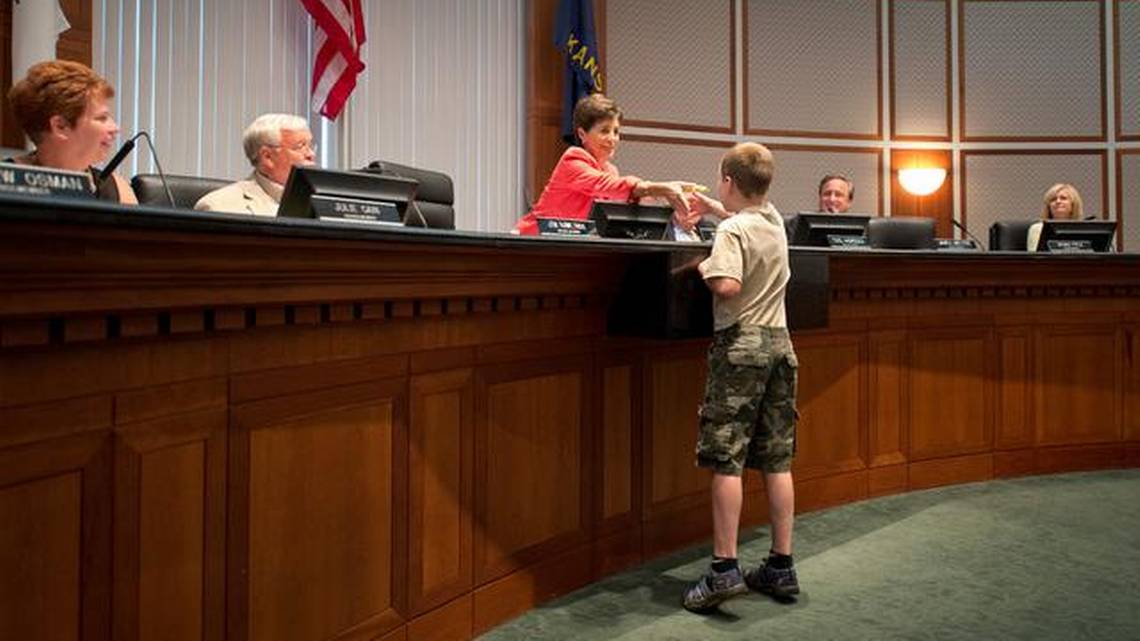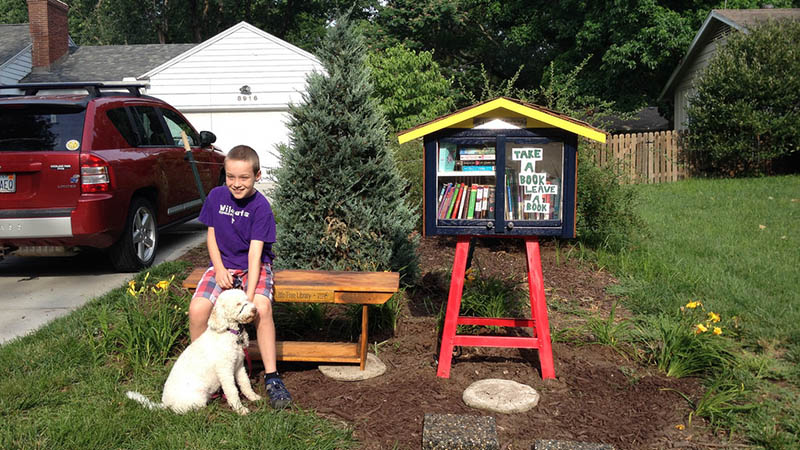When 9-year-old Spencer Collins put up a Little Free Library in his town of Leawood, Kansas, the City Council promptly told him to take it down. They cited a city ordinance that stated: “No detached structure including garages, barns, sheds, greenhouses, above ground pools, or outbuildings, shall be permitted, unless expressly allowed.” This sparked a local controversery and plenty of media coverage, resulting in Spencer making a speech to the City Council and the ultimate restoration of Spencer’s little library. Get the full story here.
If you want to establish little libraries in your town you may come face-to-face with these types of city ordinances and zoning laws. If you don’t know whose permission to seek, check out our FAQs page which offers strategies for getting permission from local governing bodies and dealing with HOAs. If you’re looking for more, visit the how-tos section at the bottom of the Start a Little Free Library page.
Many cities now have official policies in place governing little libraries. Here is how the City of Derby, Kentucky handled the new little libraries showing up around town (courtesy of Jo Simon).
Any individual or organization desiring to place a Little Free Library should be advised of the following: Little Free Libraries meeting the below listed conditions are not subject to permitting or licensing requirements of the City of Derby.
- Little Free Libraries are considered as an accessory use, and are permitted in any zoning district; provided that, all such libraries meet the following placement requirements:
- Shall not be located within or overhang the public street right-of-way or any public easement;
- Shall not obstruct vehicular, bicycle or pedestrian traffic, either physically, or by a person utilizing the Little Free Library;
- Shall not obstruct access aisles or paths utilized by persons in wheelchairs or for ADA accessibility;
- May be placed as a permitted obstruction in a required front yard (area between the front wall of a building and the public street right-of-way);
- Enclosures shall be sized and arranged such that no person or child is able to enter;
- Shall be anchored to the ground or otherwise securely attached to something having a permanent location on the ground.
The City of Derby encourages prospective operators of Little Free Libraries to submit proposed locations for review by City of Derby staff to ensure the above listed requirements have been satisfied.


OK, so what if your town is being really strict and you need to go before the City Council or seek a variance in zoning laws? We consulted with Professor Laurence H. Tribe and Tristan Duncan of Shook, Hardy and Bacon L.L.P. to get their input on Spencer’s case. If your town is using a similar argument to the one the City Council of Leawood used (little libraries are “prohibited detached structures”), here are some arguments Duncan and Tribe suggested:
1. Is your library similar to other “detached” (but likely allowed) structures like birdhouses? If the “detached structure” ordinance is interpreted to prohibit a Little Free Library but not a birdhouse or other similarly small free-standing object that has no communicative function, then it raises real free speech problems. So, a question for your City Council is: what other exceptions are made to the “detached structure” ordinance? The City cannot constitutionally permit bird feeders, for example, but discriminate against little libraries. That preferential treatment arguably abridges Free Speech under the First Amendment of the Federal Constitution.
2. Is your library more like a piece of freestanding art than a shed? Suggest to the authorities in question that the “detached structure” ordinance may not even apply since your library is more like a piece of neighborhood art. Many cities have Art Objectordinances that permit structures in the yard with an aesthetic quality. The First Amendment also protects symbolic and aesthetic ways of communicating beyond the written word; you might have a double whammy argument. Your library is both a structure serving a communicative/educational function as well as aesthetic expression.
3. Is your library more like sign than a shed? Sign ordinances must meet a very strict standard before the City can prohibit their erection since they have a communicative function, which the First Amendment protects. Similar reasoning should apply to your library.
Arguing to keep your library is one way to go, but you might also consider looking for loopholes in the rules. Tricia Rightmire of Shawnee, Kansas did just that. When she found out that her HOA’s bylaws wouldn’t let her have a freestanding object in her yard, she got creative.
“I decided to work around [the bylaws] by putting my collection in a wagon, calling it a Little Free Bookmobile, and taking it on a daily walk around the neighborhood!” said Tricia. “I’ve got signs coming and have drummed up some community enthusiasm and book donations!”
Whatever your situation, we hope that the tips above help you start a little library or keep yours running. We have found that City Council members, HOAs and neighbors (even the grumpy ones) are all just people who can learn to love little libraries if you’re willing to work with them. Whenever possible, keep it friendly and show that you’re willing to abide by the rules. And if all else fails, a little creativity can go a long way.
